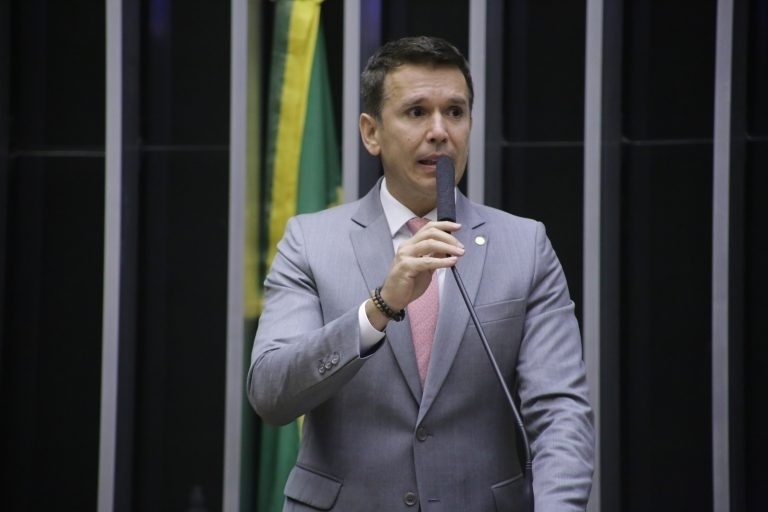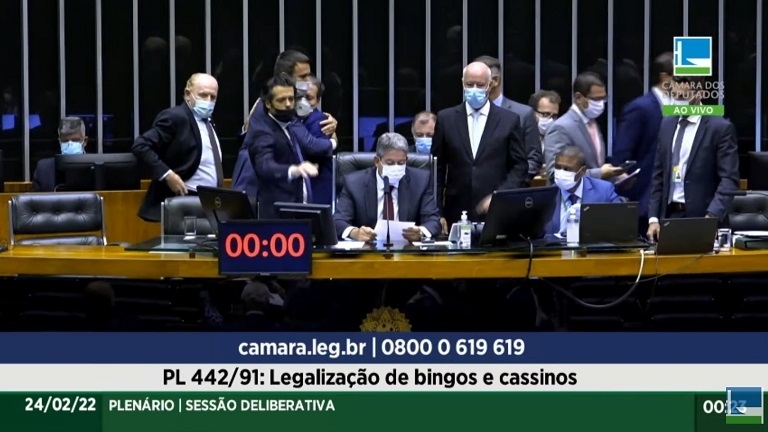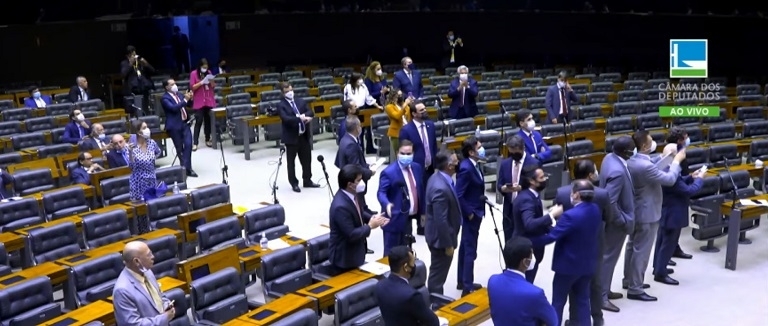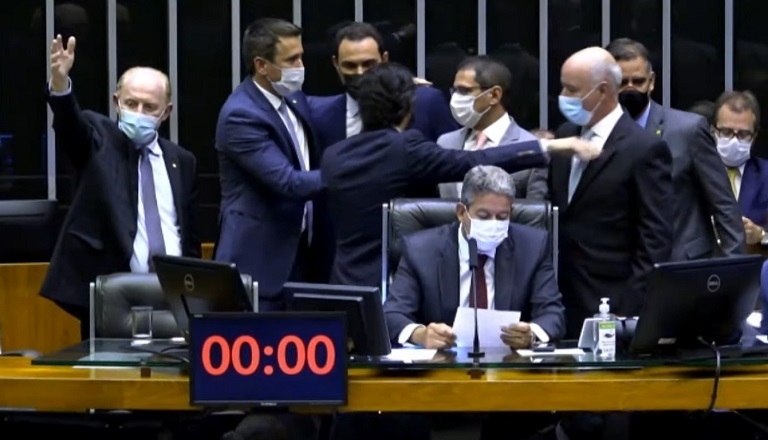

Read here the basic text of bill 442/91 that legalizes gambling in Brazil (in Portuguese)
Throughout the day, Carreras maintained a permanent dialogue with the leaders of the benches to analyze the 37 amendments that the project received and, thus, shape the final text that was presented in the Plenary. Among the last minute modifications, it was decided to remove sports betting (quota fixa) from the Bill since the Ministry of Economy is already in the final stages of a regulation covered by law 13.756 of 2018.
At the beginning of the discussions and even before the reading of the final report, some attempts to withdraw the project from the agenda began by the opposition to the sector, overturned by 243 votes against.
A chapter was also added for turf entities that will finally be able to explore bingo games and video-bingo. In relation to the organization of the market, this will be regulated and supervised by the Union, through the Ministry of Economy (it does not appear to have been in charge of the Ministry of Tourism) to be defined in its own law.

The opinion of Deputy Felipe Carreras (PSB-PE) on the gambling project provides for a contribution of 17% on the gross revenue resulting from the activity, the creation of an inspection fee for issuing a license and an incidence of Income Tax of 20% on the net prizes equal to or greater than R$ 10,000.
Carreras' text determines that the gaming market must be regulated and supervised by the Union through a federal regulatory and supervisory body to be defined in its own law. The text regulates activities such as casino, bingo, jogo do bicho and online gaming. To operate in the segment, it will be necessary to obtain authorization for the constitution of gaming operating entities and a license to operate.
In the report, Carreras highlights that, currently, betting activities, most of the time, operate in Brazil in an informal way and do not pay any taxes.
“With the growth of online betting, there is competition between jurisdictions (a Brazilian can easily place bets on foreign sites). These factors make the sector have high tax-amendment elasticity, so that the size of the market is quite sensitive to the weight of taxation,” he indicated.
The proposal creates Cide-Jogos, with a rate of 17% for gaming. The contribution will have as a triggering event the exploitation of games and bets. The calculation basis will be the gross operating income resulting from the activity, with the deduction of the amount received by players and bettors as prizes.

According to the text, after the deduction of the paid prizes, the operators must transfer 0.68% of the gross revenue directly to the financing of the training of athletes. Of this percentage, 0.48% will be allocated to the CBC (Brazilian Committee of Clubs) and 0.2% to the CBCP (Brazilian Committee of Paralympic Clubs).
Carreras indicated that the resources from Cide-Jogos will be destined to Embratur (10%) to finance programs and actions in the area of sports (10%) to finance programs and actions of the National Policy for the Protection of Players and Gamblers ( 6%) and the financing of programs and actions for animal defense and protection (6%).
They will also be applied in the financing of health programs and actions related to ludopathy (6%), in the National Public Security Fund (6%), in the National Culture Fund (10%), in the National Fund for Children and Adolescents ( 6%) and in the participation funds of states (20%) and municipalities (20%).

The text also includes the inspection fee for gambling and betting, the triggering event of which is the exercise of the police power legally assigned to the Ministry of Economy for the inspection of activities. According to the opinion, bingo operators will pay a fee of R$ 20,000 per licensed establishment. Online gaming will pay R$ 600,000 per licensed domain. Casinos, R$ 600,000 per licensed establishment, while jogo do bicho will pay a fee of R$ 20,000 per licensed entity.
The fee will be paid quarterly, in reais (local currency). The collection will be made until the 10th of the months of January, April, July and October of each year. The report provides for the levy of 20% of Income Tax for individuals on net prizes equal to or greater than R$10,000. The tax will be withheld at source by the operator.
Regarding the casinos, the license will be through a technical tender and proposed price and the highest bid to obtain the license and with paid-in capital of R$ 100 million. It is forbidden to license more than one establishment per state to the same economic group and more than five to the same economic group in the national territory.
The limited existence of licenses for integrated casinos is conditioned to the population criterion of 1 license for UF with up to 15 million inhabitants, 2 licenses for UF between 15 million and 25 million inhabitants and 3 licenses for UF with more than 25 million inhabitants. The text includes the possibility of operating casinos on river vessels and an additional license for the states of Pará and Amazonas due to their territorial dimensions.
The Executive Power may grant the exploitation of casino games on river or sea vessels in the national territory for up to 10 (ten) establishments.

For bingos, 1 venue is limited to every 150,000 inhabitants per municipality and with paid-in capital of R$ 10 million. Limited to 400 video bingo machines per establishment and authorizes operation in stadiums with a capacity of over 15,000 fans. Likewise, tourist entities will be able to explore bingo and video-bingo games.
Regarding jogo do bicho, the license will be through a bidding process of the largest investment proposed and the largest proposal to obtain the license, with a minimum value equivalent to the paid-in capital, with a paid-in capital of R$ 10 million and a resource reserve in guarantee for payment. Every 700 thousand inhabitants can be granted a license in each unit of the federation.
The exploitation of online gaming, through bets on electronic marketing channels, via the internet, mobile telephony, mobile computing devices or any other authorized digital communication channels, is authorized by means of accreditation with the Ministry of Economy.
The new law prohibits, throughout the country, advertising and commercial promotion of domain names for websites that offer or have as their object the practice or exploitation of gambling or betting that has not been properly registered in the country.
In addition, it determines that internet connection and application providers based in the country will not be able to allow access to websites, nor the availability, for consideration or free, of applications that offer games and bets that are not registered with the Ministry of Economy.
The project creates the national registry of banned, a large database aimed at registering players banned from entering gaming environments.
The opinion also includes a part on crimes against gambling and betting, such as exploiting any kind and form of gambling, physical or virtual, including through gambling machines, websites or applications on the internet, without meeting the requirements of the law. The prescribed penalty is imprisonment, from four to seven years, and a fine.
It also establishes the crime of defrauding, adulterating, concealing or directing the result of a game or bet, by any means or form, or paying prize in violation of the law. The penalty is imprisonment, from four to seven years, and a fine.
In order to minimize the crime of money laundering, the project proposes a change in the law that deals with the subject to provide for the application of the double penalty to crimes committed with the aid of the exploitation of games and bets. It also brings the revocation of the establishment's location and operating license as a mandatory effect of the conviction.
Source: GMB